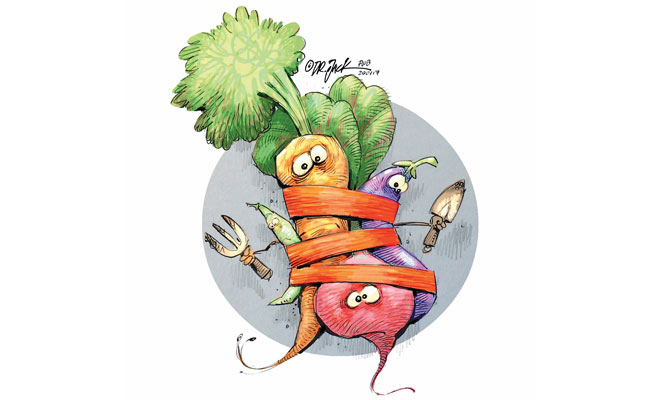
In a world where food security is already under threat from factors such as urbanisation and climate change, the changes wrought in community food systems by globalisation are putting a major strain on food accessibility and availability, especially in vulnerable communities.
Global food and agriculture laws should provide a clear method to ensure future food security. But the Food and Agriculture Organization of the United Nations (FAO) treaty, the 1992 Convention on Biological Diversity (CBD) and other legislation are all problematic in this regard.
The FAO treaty, for example, created a global network of gene banks to store and conserve varieties of plants, genetic resources (GRs) and associated information.
These banks are open to the public. As a result, global food corporations often gain access to resources and then patent them, after a minimum of ‘gene fixing’, for exclusive commercial exploitation, to the detriment of the farmers who developed the GRs.
(This is analogous to changing the colours used in the cartoon on the opposite page and as a result claiming the original artwork as one’s own and obtaining the sole rights to it.)
The CBD promotes international co-operation to safeguard biodiversity, with Article 15 stating that both provider and user shall take legislative and administrative measures to obtain their fair share from the utilisation of plant resources, GRs and associated knowledge.
But when it comes to access and benefit-sharing (ABS), rights and obligations are
hard to enforce once the jurisdiction is transferred to the user.
Although Article 15 holds that the user state must share the benefits with the provider state, there is no indication of how the shared benefit reaches the particular state, or what happens when the user state fails to comply.
The 2010 Nagoya Protocol sought to add a legally binding framework to the CBD. But it focuses on the implementation of ABS agreements and lacks detail on how the implementation processes can be enforced.
The CBD also needs an additional mechanism for global tracking of the use of GRs in patent applications.
In short, what is required is a way to identify misappropriation of any biological material and associated information or knowledge, which may have been used in various innovation processes and patented to legitimise misappropriation.
Intellectual property
Many developing countries view the application of intellectual property (IP) to agriculture in its present form as problematic, serving only the interests of advanced sectors, and not those of vulnerable communities and ordinary farmers.
For example, the 2001 International Treaty on Plant Genetic Resources for Food and Agriculture replicates plant resources and GRs common to the FAO gene bank.
The problem is that the treaty allows IP protection to biotech farmers, but denies it to traditional farmers. This has the potential to create unfair competition in agricultural trade between traditional and biotech farmers.
Even though the farmers’ rights are mentioned in the treaty, the latter does not provide clear direction on how farmers’ rights should be protected at the multinational level.
The increasing imbalanced application of patent law in agricultural industries aggravates the situation of small-scale farmers, preventing them from progressing from the use of agricultural innovation to addressing local food security.
Currently, 90% of the genetically modified food products found in grocery retailer stores are owned by the following eight companies from the developed world: Kraft (US), Nestlé (Switzerland), Coca-Cola (US), PepsiCo (US), Kellogg’s (US), Mars (UK), General Mills (US) and Unilever (Netherlands-UK).
This creates monopolies in certain jurisdictions, and increases unfair competition.
We are not suggesting that patent law application in agriculture be scrapped, but that the system be changed to distribute economic benefits and burdens fairly.
Furthermore, lack of investment in IP has so far restricted developing countries in terms of their global economic participation and they bear the burden of providing GRs and associated knowledge. Africa, for one, needs skills to assist in IP negotiation and ways to find alternative strategies to protect GRs and associated knowledge.
This may help prevent over-exploitation and further degradation of the plant resources, GRs and associated knowledge, as well as support the local economy and mitigate food insecurity.
Inclusive and balanced
With the law and economic benefits focused on bioengineering, ordinary farmers have been forced to buy food rather than farm for themselves and their communities.
Failing to promote equitable economic benefits and burdens among nations at all levels will aggravate food insecurity and result in greater loss of resources and knowledge to farming.
The solutions currently available are all rooted in the same rules and policies that created the imbalance in the distribution of benefits and burdens in food and agriculture, and need to be corrected.
The existing mix of complex global rules governing agriculture and food prevents ordinary farmers from progressing in farming.
The latest FAO report indicates that 75% of crop diversity was lost between 1990 and 2000, and predicts that as much as 22% of the wild relatives of important plants and seed for food will disappear by 2050.
Changes to laws must be made to help elevate, preserve and safeguard biodiversity for food needed for the growing human population. What is required is an inclusive and balanced legal framework that distributes economic benefits and burdens fairly across the members of society.
The views expressed in our weekly opinion piece do not necessarily reflect those of Farmer’s Weekly.
‘Impact of global food and agriculture laws on Africa’s food security’ first appeared in De Jure law journal. Gebrehiwot is a post-doctoral research fellow at the University of South Africa; Cornelius is a professor of intellectual property law at the University of Pretoria; and Korsten is a professor of plant and soil sciences at the University of Pretoria.











